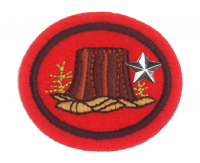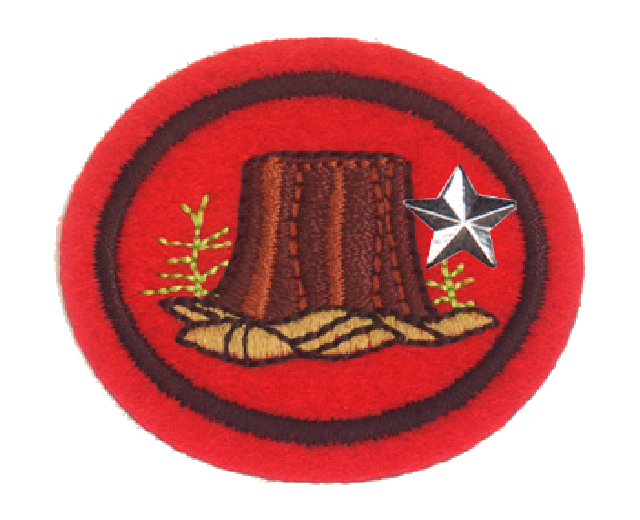Difference between revisions of "AY Honors/Forestry - Advanced/Requirements"
Jomegat bot (talk | contribs) (Bot: Automated import of articles *** existing text overwritten ***) |
m |
||
| Line 1: | Line 1: | ||
{{HonorSubpage}} | {{HonorSubpage}} | ||
| − | |||
| − | |||
<section begin=Body /> | <section begin=Body /> | ||
| − | + | <b>1. <section begin=req1 /><noinclude><translate></noinclude>Prerequisites: AY Tree Honor; Forestry Honor. | |
| − | <b>1. <section begin=req1 /><noinclude><translate></noinclude>Prerequisites: AY Tree Honor; Forestry Honor. | ||
<noinclude></translate></noinclude><section end=req1 /></b> | <noinclude></translate></noinclude><section end=req1 /></b> | ||
| − | <b>2. <section begin=req2 /><noinclude><translate></noinclude>Define the following terms: | + | <b>2. <section begin=req2 /><noinclude><translate></noinclude>Define the following terms: |
<noinclude></translate></noinclude><section end=req2 /></b> | <noinclude></translate></noinclude><section end=req2 /></b> | ||
| − | :<b>a. <section begin=req2a /><noinclude><translate></noinclude>Basal area | + | :<b>a. <section begin=req2a /><noinclude><translate></noinclude>Basal area |
<noinclude></translate></noinclude><section end=req2a /></b> | <noinclude></translate></noinclude><section end=req2a /></b> | ||
| − | :<b>b. <section begin=req2b /><noinclude><translate></noinclude>Bole | + | :<b>b. <section begin=req2b /><noinclude><translate></noinclude>Bole |
<noinclude></translate></noinclude><section end=req2b /></b> | <noinclude></translate></noinclude><section end=req2b /></b> | ||
| − | :<b>c. <section begin=req2c /><noinclude><translate></noinclude>DBH (diameter) | + | :<b>c. <section begin=req2c /><noinclude><translate></noinclude>DBH (diameter) |
<noinclude></translate></noinclude><section end=req2c /></b> | <noinclude></translate></noinclude><section end=req2c /></b> | ||
| − | :<b>d. <section begin=req2d /><noinclude><translate></noinclude>Seed tree cut | + | :<b>d. <section begin=req2d /><noinclude><translate></noinclude>Seed tree cut |
<noinclude></translate></noinclude><section end=req2d /></b> | <noinclude></translate></noinclude><section end=req2d /></b> | ||
| − | :<b>e. <section begin=req2e /><noinclude><translate></noinclude>Selective cutting | + | :<b>e. <section begin=req2e /><noinclude><translate></noinclude>Selective cutting |
<noinclude></translate></noinclude><section end=req2e /></b> | <noinclude></translate></noinclude><section end=req2e /></b> | ||
| − | :<b>f. <section begin=req2f /><noinclude><translate></noinclude>Shelterwood cut | + | :<b>f. <section begin=req2f /><noinclude><translate></noinclude>Shelterwood cut |
<noinclude></translate></noinclude><section end=req2f /></b> | <noinclude></translate></noinclude><section end=req2f /></b> | ||
| − | :<b>g. <section begin=req2g /><noinclude><translate></noinclude>Silviculture | + | :<b>g. <section begin=req2g /><noinclude><translate></noinclude>Silviculture |
<noinclude></translate></noinclude><section end=req2g /></b> | <noinclude></translate></noinclude><section end=req2g /></b> | ||
| − | :<b>h. <section begin=req2h /><noinclude><translate></noinclude>Canopy | + | :<b>h. <section begin=req2h /><noinclude><translate></noinclude>Canopy |
<noinclude></translate></noinclude><section end=req2h /></b> | <noinclude></translate></noinclude><section end=req2h /></b> | ||
| − | :<b>i. <section begin=req2i /><noinclude><translate></noinclude>Crown | + | :<b>i. <section begin=req2i /><noinclude><translate></noinclude>Crown |
<noinclude></translate></noinclude><section end=req2i /></b> | <noinclude></translate></noinclude><section end=req2i /></b> | ||
| − | :<b>j. <section begin=req2j /><noinclude><translate></noinclude>Pulpwood | + | :<b>j. <section begin=req2j /><noinclude><translate></noinclude>Pulpwood |
<noinclude></translate></noinclude><section end=req2j /></b> | <noinclude></translate></noinclude><section end=req2j /></b> | ||
| − | :<b>k. <section begin=req2k /><noinclude><translate></noinclude>Succession | + | :<b>k. <section begin=req2k /><noinclude><translate></noinclude>Succession |
<noinclude></translate></noinclude><section end=req2k /></b> | <noinclude></translate></noinclude><section end=req2k /></b> | ||
| − | :<b>l. <section begin=req2l /><noinclude><translate></noinclude>Thinning | + | :<b>l. <section begin=req2l /><noinclude><translate></noinclude>Thinning |
<noinclude></translate></noinclude><section end=req2l /></b> | <noinclude></translate></noinclude><section end=req2l /></b> | ||
| − | :<b>m. <section begin=req2m /><noinclude><translate></noinclude> | + | :<b>m. <section begin=req2m /><noinclude><translate></noinclude>Rotatio |
<noinclude></translate></noinclude><section end=req2m /></b> | <noinclude></translate></noinclude><section end=req2m /></b> | ||
| Line 60: | Line 57: | ||
<noinclude></translate></noinclude><section end=req2p /></b> | <noinclude></translate></noinclude><section end=req2p /></b> | ||
| − | <b>3. <section begin=req3 /><noinclude><translate></noinclude>Study five tree species important to forestry in your area and give the following information about each: | + | <b>3. <section begin=req3 /><noinclude><translate></noinclude>Study five tree species important to forestry in your area and give the following information about each: |
| − | :a. common and scientific name | + | :a. common and scientific name |
| − | :b. range of tree | + | :b. range of tree |
| − | :c. height and diameter of tree at maturity | + | :c. height and diameter of tree at maturity |
| − | :d. economic importance of tree | + | :d. economic importance of tree |
| − | :e. important pests (insects, disease, etc.) of the tree | + | :e. important pests (insects, disease, etc.) of the tree |
| − | :f. habitat of tree, forest zone, and elevation | + | :f. habitat of tree, forest zone, and elevation |
| − | :g. common age of rotation (harvesting) for various uses | + | :g. common age of rotation (harvesting) for various uses |
<noinclude></translate></noinclude><section end=req3 /></b> | <noinclude></translate></noinclude><section end=req3 /></b> | ||
| − | <b>4. <section begin=req4 /><noinclude><translate></noinclude>What methods are used to insure reforestation of a harvest area? | + | <b>4. <section begin=req4 /><noinclude><translate></noinclude>What methods are used to insure reforestation of a harvest area? |
<noinclude></translate></noinclude><section end=req4 /></b> | <noinclude></translate></noinclude><section end=req4 /></b> | ||
| − | <b>5. <section begin=req5 /><noinclude><translate></noinclude>On a map of your country, draw the forest areas and indicate the types of forest in each area. | + | <b>5. <section begin=req5 /><noinclude><translate></noinclude>On a map of your country, draw the forest areas and indicate the types of forest in each area. |
<noinclude></translate></noinclude><section end=req5 /></b> | <noinclude></translate></noinclude><section end=req5 /></b> | ||
| Line 79: | Line 76: | ||
<noinclude></translate></noinclude><section end=req6 /></b> | <noinclude></translate></noinclude><section end=req6 /></b> | ||
| − | <b>7. <section begin=req7 /><noinclude><translate></noinclude>Tour one of the following, or write a report with diagrams about operations. | + | <b>7. <section begin=req7 /><noinclude><translate></noinclude>Tour one of the following, or write a report with diagrams about operations. |
<noinclude></translate></noinclude><section end=req7 /></b> | <noinclude></translate></noinclude><section end=req7 /></b> | ||
| Line 92: | Line 89: | ||
<section begin=challenge /> | <section begin=challenge /> | ||
| − | <b>8. <section begin=req8 /><noinclude><translate></noinclude>Do a forest survey in a typical forest for your area. Using a prism, mark all trees large enough to be counted “in”, and record the following data for each “in” tree, and record the basal area by species for the whole plot: | + | <b>8. <section begin=req8 /><noinclude><translate></noinclude>Do a forest survey in a typical forest for your area. Using a prism, mark all trees large enough to be counted “in”, and record the following data for each “in” tree, and record the basal area by species for the whole plot: |
<noinclude></translate></noinclude><section end=req8 /></b> | <noinclude></translate></noinclude><section end=req8 /></b> | ||
| − | :<b>a. <section begin=req8a /><noinclude><translate></noinclude>Common and scientific name | + | :<b>a. <section begin=req8a /><noinclude><translate></noinclude>Common and scientific name |
<noinclude></translate></noinclude><section end=req8a /></b> | <noinclude></translate></noinclude><section end=req8a /></b> | ||
| Line 108: | Line 105: | ||
<section end=challenge /> | <section end=challenge /> | ||
| − | <b>9. <section begin=req9 /><noinclude><translate></noinclude>Participate in a reforestation project | + | <b>9. <section begin=req9 /><noinclude><translate></noinclude>Participate in a reforestation project |
<noinclude></translate></noinclude><section end=req9 /></b> | <noinclude></translate></noinclude><section end=req9 /></b> | ||
<section end=Body /> | <section end=Body /> | ||
Revision as of 18:39, 17 May 2021
1. Prerequisites: AY Tree Honor; Forestry Honor.
2. Define the following terms:
- a. Basal area
- b. Bole
- c. DBH (diameter)
- d. Seed tree cut
- e. Selective cutting
- f. Shelterwood cut
- g. Silviculture
- h. Canopy
- i. Crown
- j. Pulpwood
- k. Succession
- l. Thinning
- m. Rotatio
- n. Sawtimber
- o. Climax forest
- p. Habitat
3. Study five tree species important to forestry in your area and give the following information about each:
- a. common and scientific name
- b. range of tree
- c. height and diameter of tree at maturity
- d. economic importance of tree
- e. important pests (insects, disease, etc.) of the tree
- f. habitat of tree, forest zone, and elevation
- g. common age of rotation (harvesting) for various uses
4. What methods are used to insure reforestation of a harvest area?
5. On a map of your country, draw the forest areas and indicate the types of forest in each area.
6. Write a short report (250 words or more) on the importance of the forests in your country. Include such topics as the importance of wood for timber, paper (pulp), and firewood; wildlife habitat; livestock grazing; good water quality; and recreation for people.
7. Tour one of the following, or write a report with diagrams about operations.
- a. Sawmill
- b. Pulp mill
- c. Furniture factory
8. Do a forest survey in a typical forest for your area. Using a prism, mark all trees large enough to be counted “in”, and record the following data for each “in” tree, and record the basal area by species for the whole plot:
- a. Common and scientific name
- b. DBH
- c. Height
- d. Age (determined by increment borer)
9. Participate in a reforestation project


